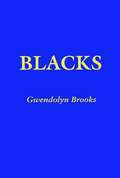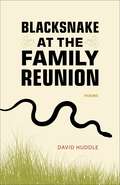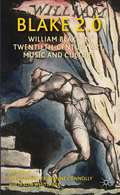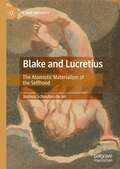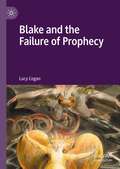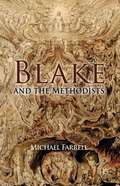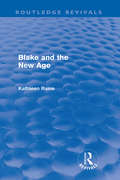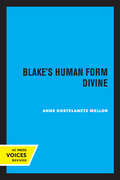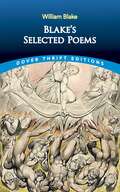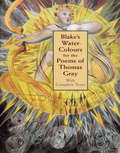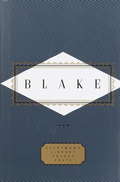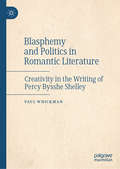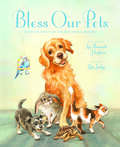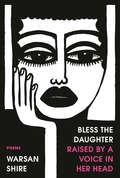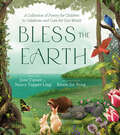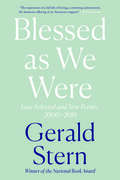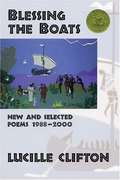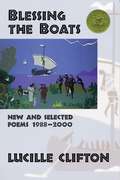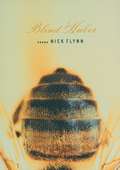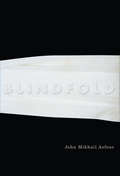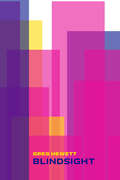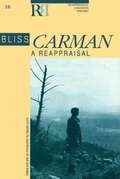- Table View
- List View
Blacks
by Gwendolyn BrooksHere is a necessary collection of poetry for admirers of words and treasurers of literary beauty. Spanning over 30 years, this collection of literary masterpieces by the venerable Ms. Gwendolyn Brooks, arguably Illinois' most beloved Poet Laureate and Chicago's elder Black literary stateswoman, Blacks includes all of Ms. Brooks' critically acclaimed writings. Within its covers is the groundbreaking "Annie Allen," which earned her the Pulitzer Prize in 1950, making her the first Black to achieve that honor. There is also the sweepingly beautiful and finely crafted "A Street in Bronzeville," a highly anticipated and lauded poetic treasure that spoke volumes for this great poet's love of Black people, Chicago's Black community, and even the community of the world. Blacks includes a special treat, Maud Martha, Brooks' only novel.
Blacksnake at the Family Reunion: Poems (Southern Messenger Poets)
by David HuddleDavid Huddle's latest collection, Blacksnake at the Family Reunion, shares intimate and amusing stories as if told by a quirky, usually reticent, great uncle. In "Boy Story," a teenage romantic meeting ends abruptly when the boy's sweetheart realizes they have parked near her grandmother's grave. The poem "Aloft" recalls a widowed mother's indignation after she receives a marriage proposal in a hot air balloon. Haunted by the words on his older sister's tombstone -- "born & died... then / a single date / in November" -- the speaker in one poem struggles to understand a tragic loss: "The ampersand / tells the whole truth / and nothing but, / so help me God, / whose divine shrug / is expressed so / eloquently / by that grave mark."Blacksnake at the Family Reunion continues Huddle's poetic inquiry into the power of early childhood and family to infuse adulthood with sadness and despair -- an inquiry conducted with profound empathy for the fragility of humankind.
Blake 2.0
by Steve Clark Tristanne Connolly Jason WhittakerBlake said of his works, 'Tho' I call them Mine I know they are not Mine'. So who owns Blake? Blake has always been more than words on a page. This volume takes Blake 2. 0 as an interactive concept, examining digital dissemination of his works and reinvention by artists, writers, musicians, and filmmakers across a variety of twentieth-century media.
Blake and Lucretius: The Atomistic Materialism of the Selfhood (The New Antiquity)
by Joshua Schouten de JelThis book demonstrates the way in which William Blake aligned his idiosyncratic concept of the Selfhood – the lens through which the despiritualised subject beholds the material world – with the atomistic materialism of the Epicurean school as it was transmitted through the first-century BC Roman poet and philosopher Lucretius’ De Rerum Natura. By addressing this philosophical debt, this study sets out a threefold re-evaluation of Blake’s work: to clarify the classical stream of Blake’s philosophical heritage through Lucretius; to return Blake to his historical moment, a thirty-year period from 1790 to 1820 which has been described as the second Lucretian moment in England; and to employ a new exegetical model for understanding the phenomenological parameters and epistemological frameworks of Blake’s mythopoeia. Accordingly, it is revealed that Blake was not only aware of classical atomistic cosmogony and sense-based epistemology but that he systematically mapped postlapsarian existence onto an Epicurean framework.
Blake and the Failure of Prophecy
by Lucy CoganThis monograph reorients discussion of Blake’s prophetic mode, revealing it to be not a system in any formal sense, but a dynamic, human response to an era of momentous historical change when the future Blake had foreseen and the reality he was faced with could not be reconciled. At every stage, Blake’s writing confronts the central problem of all politically minded literature: how texts can become action. Yet he presents us with no single or, indeed, conclusive answer to this question and in this sense it can be said that he fails. Blake, however, never stopped searching for a way that prophecy might be made to live up to its promise in the present. The twentieth-century hermeneuticist Paul Ricoeur shared with Blake a preoccupation with the relationship between time, text and action. Ricoeur’s hermeneutics thus provide a fresh theoretical framework through which to analyse Blake’s attempts to fulfil his prophetic purpose.
Blake and the Methodists
by Michael FarrellExploring the work of William Blake within the context of Methodism - the largest 'dissenting' religious group during his lifetime - this book contributes to ongoing critical debates surrounding Blake's religious affinities by suggesting that, contrary to previous thinking, Blake held sympathies with certain aspects of Methodism.
Blake and the New Age (Routledge Revivals)
by Kathleen RaineFirst published in 1979, this is a very welcome reissue of Kathleen Raine's seminal study of William Blake - England’s only prophet. He challenged with extraordinary vigour the premises which now underline much of Western civilization, hitting hard at the ideas of a naive materialist philosophy which, even in his own day, was already eating at the roots of English national life. In his insistence that ‘mental things are alone real’, Blake was ahead of his time. Materialist views are now challenged from various quarters; the depth psychologies of Freud and Jung, the study of Far Easter religion and philosophy, the reappraisal of myth and folk lore, the wealth of psychical research have all prepared the way for an understanding of Blake’s thought. We are ready to acknowledge that in attacking ‘the sickness of Albion’ Blake penetrated to the inner worlds of man and explored them in a way that is quite unique. Dr Raine, who has made a long study of Blake’s sources, presents him as a lonely powerful genius who stands within the spiritual tradition of Sophia Perennis, ‘the Everlasting Gospel’. From the standpoint of this great human Norm, our immediate past described by W.B. Yeats as ‘the three provincial centuries’, is a tragic deviation; catastrophic, as Blake believed, in its spiritual and material consequences. Only now do we possess the necessary knowledge to understand William Blake and the ever-growing number of people who turn to him surely justifies his faith in the eternal truths he strove to communicate.
Blake's Human Form Divine
by Ann K. MellorThis title is part of UC Press's Voices Revived program, which commemorates University of California Press’s mission to seek out and cultivate the brightest minds and give them voice, reach, and impact. Drawing on a backlist dating to 1893, Voices Revived makes high-quality, peer-reviewed scholarship accessible once again using print-on-demand technology. This title was originally published in 1974.
Blake's Selected Poems (Dover Thrift Editions)
by William BlakeRegarded by a contemporary as a "brilliant eccentric whose works skirted the outer fringes of English art and literature," William Blake (1757-1827) is today recognized as a major poet and artist. This collection of 104 poems, carefully chosen by noted Blake scholars David and Virginia Erdman, reveals the lyricism, mystical vision, and consummate craftsmanship that have earned the poet his preeminent place with both critics and the general public. Among the selections included here are "Proverbs of Hell" from The Marriage of Heaven and Hell - a satire on religion and morality considered Blake's most inspired and original work; "A Song of Liberty," "The Argument," "The Mental Traveller," "Gwin, King of Norway," "The Land of Dreams," "William Bond," "To the Evening Star," and many more.
Blake's Water-Colours for the Poems of Thomas Gray: With Complete Texts
by William BlakeAt the dawn of the 19th century, Blake created this imaginative series of 116 watercolors to illustrate 13 poems by Thomas Gray. Including such popular poems as "Elegy in a Country Churchyard" and "Ode on the Death of a Favourite Cat," these rarely exhibited treasures remained exclusively in the hands of collectors for close to 175 years. This is the first inexpensive, full-color reproduction, with the complete text of the poems.
Blake: Poems
by William BlakeThese Everyman's Library Pocket Poets hardcover editions are popular for their compact size and reasonable price which do not compromise content. Poems: Blake contains a full selection of Blake's work, including Songs of Innocence, Songs of Experience, poems from Blake's Ms. book, poems from The Prophetic Books, and an index of first lines.
Blasphemy and Politics in Romantic Literature: Creativity in the Writing of Percy Bysshe Shelley
by Paul WhickmanThis book argues for the importance of blasphemy in shaping the literature and readership of Percy Bysshe Shelley and of the Romantic period more broadly. Not only are perceptions of blasphemy taken to be inextricable from politics, this book also argues for blasphemous ‘irreverence’ as both inspiring and necessitating new poetic creativity. The book reveals the intersection of blasphemy, censorship and literary property throughout the ‘Long Eighteenth Century’, attesting to the effect of this connection on Shelley’s poetry more specifically. Paul Whickman notes how Shelley’s perceived blasphemy determined the nature and readership of his published works through censorship and literary piracy. Simultaneously, Whickman crucially shows that aesthetics, content and the printed form of the physical text are interconnected and that Shelley’s political and philosophical views manifest themselves in his writing both formally and thematically.
Bless Our Pets: Poems of Gratitude for Our Animal Friends
by Lita Judge&“Perfect for animal lovers . . . filled with raw emotion and love for a diverse collection of animals who unconditionally love us back.&” — Booklist &“Sure to warm the cockles of any pet owner&’s heart.&” — Kirkus ReviewsA celebration of creatures—and one of the last books edited by beloved children&’s poet Lee Bennett Hopkins. In this adorable, often amusing collection, Rebecca Kai Dotlich, Lois Lowry, and twelve other poets give thanks for those who bark, purr, chitter, and slither. The poems feature fourteen different animal companions, including a cat snoozing in her bed, a goldfish dancing in her bowl, and a gerbil nestling in an overall pocket. Illustrated in warm, tender detail by Lita Judge, Bless Our Pets captures the charms—and antics—of pets and the people who love them. From puppies to mice to turtles to ponies, this endearing anthology expresses children&’s gratitude for creatures big and small. Bless Our Pets is the perfect tribute to the friends who bring so much joy into our everyday lives. Poems by… • Ann Whitford Paul • Rebecca Kai Dotlich • Linda Trott Dickman • Eric Ode • Ralph Fletcher • Sarah Grace Tuttle • Kristine O&’Connell George • Darren Sardelli • B.J. Lee • Charles Ghigna • Lois Lowry • Prince Redcloud • Joan Bransfield Graham • Lee Bennett Hopkins
Bless the Daughter Raised by a Voice in Her Head: Poems
by Warsan ShirePoems of migration, womanhood, trauma, and resilience from the celebrated collaborator on Beyoncé's Lemonade and Black Is King, award-winning Somali British poet Warsan Shire. &“The beautifully crafted poems in this collection are fiercely tender gifts.&”—Roxane Gay, author of Bad Feminist and HungerMama, I made it/out of your home/alive, raised by the/voices in my head.With her first full-length poetry collection, Warsan Shire introduces us to a young girl, who, in the absence of a nurturing guide, makes her own stumbling way towards womanhood. Drawing from her own life, as well as pop culture and news headlines, Shire finds vivid, unique details in the experiences of refugees and immigrants, mothers and daughters, Black women, and teenage girls. In Shire's hands, lives spring into fullness. This is noisy life: full of music and weeping and surahs and sirens and birds. This is fragrant life: full of blood and perfume and shisha smoke and jasmine and incense. This is polychrome life: full of henna and moonlight and lipstick and turmeric and kohl. The long-awaited collection from one of our most exciting contemporary poets, this book is a blessing, an incantatory celebration of resilience and survival. Each reader will come away changed.
Bless the Daughter Raised by a Voice in Her Head: Poems
by Warsan ShirePoems of migration, womanhood, trauma, and resilience from the celebrated collaborator on Beyoncé’s Lemonade and Black Is King, award-winning Somali British poet Warsan Shire. <p><p> I made it / out of your home / alive, raised by / the voices / in my head. <p><p> With her first full-length poetry collection, Warsan Shire introduces us to a young girl, who, in the absence of a nurturing guide, makes her own way toward womanhood. Drawing from her own life, as well as pop culture and news headlines, Shire finds vivid, unique details in the experiences of refugees and immigrants, mothers and daughters, Black women and teenage girls. In Shire’s hands, lives spring into fullness. This is noisy life, full of music and weeping and surahs and sirens and birds. <p><p> This is fragrant life, full of blood and perfume and shisha smoke and jasmine and incense. This is polychrome life, full of henna and moonlight and lipstick and turmeric and kohl. The long-awaited collection from one of our most exciting contemporary poets, this book is a blessing, an incantatory celebration of resilience and survival. Each reader will come away changed.
Bless the Earth: A Collection of Poetry for Children to Celebrate and Care for Our World
by June Cotner Nancy Tupper LingA beautifully illustrated collection of poems and prayers to help children develop an appreciation for the natural worldBless the Earth, our faithful friend,her mountain range and river bend,her forest green and canopy,the hidden world of bended trees. Bless the Earth shows the miracle of our planet Earth through beautiful imagery and delightful poetry, calling all people, young and old, to care for our wonderful world. This sweet and welcoming anthology for children ages 3-7 knits together our common humanity and the natural world in an engaging way that is simple for young readers to understand.Bless the Earth contains approximately sixty selections of original as well as classic poems, divided into five chapters each:Dreams for My WorldEarth and SkyAll Creatures, Big and SmallSeasonsCaring for Our World Bless the Earth calls us again and again to understand how important it is to care for our world, respect our neighbors—humans, plants, and animals alike—and reimagine a world that is healthy and whole.
Blessed as We Were: Late Selected And New Poems, 2001-2018
by Gerald SternFinalist for the 2021 PEN/Voelcker Award for Poetry Collection An illuminating and irascible compilation of selected and new poems from National Book Award winner Gerald Stern. For five decades, Gerald Stern has been writing his own brand of expansive, deep-down American poetry. Now in his nineties, this “sometimes comic, sometimes tragic visionary” (Edward Hirsch) engages a lifetime of memories in his poems, blending philosophical, wide-ranging intellect with boisterous wit. Memory unites the poems in Blessed as We Were, which reach back through seven collections written over almost two decades. Stern explores casual miracles, relationships, and the natural world in Last Blue (2000); offers a satirical and redemptive vision in Everything Is Burning (2005) and Save the Last Dance (2008); meditates on the metamorphosis of aging in In Beauty Bright (2012); and captures the sensual joys of life—even when they are far in the past—in the wistful love poems and elegies of Galaxy Love (2017). The volume concludes with over two dozen new poems that combine the metaphysical with the domestic, from the passage of time and the cost of love to the profound banality of cardboard and its uses. With his characteristic exuberant, oracular voice animating every line, Stern reminds us why he is one of the great American poets, one who has long “been telling us that the best way to live is not so much for poetry, but through poetry” (New York Times Book Review).
Blessing the Boats: New and Selected Poems 1988-2000
by Lucille CliftonThis long-awaited collection from one of the most distinguished poets working today includes new poems written during the past four years as well as generous selections from previous collections.<P><P> Winner of the National Book Award
Blessing the Boats: New and Selected Poems 1988-2000 (American Poets Continuum)
by Lucille CliftonThe long-awaited collection by one of the most distinguished poets working today.
Blind Horse: Poems
by Jeanne BrynerPoetry. Look into the wife's eyes/ when she tells her story,/ the one she's earned. These poems of Jeanne Bryner simply, firmly bring measured dignity to the dusty world of her childhood memories. Jeanne Bryner's poems in BLIND HORSE bear witness to the small miracles that add up to survival in the harsh, difficult worlds of steel mills and mines. She documents the going into, the going under -- dark sweat trickling out the old dreams of a better life. She takes us into the workplaces, and into the homes, with an unflinching eye for telling details, the telling moments in these lives. She is too wise a poet to simply celebrate these lives or mourn for them. These tough, hard-edged poems tell the truth -- Jim Daniels.
Blind Huber: Poems
by Nick FlynnAward-winning poet Nick Flynn takes readers into the dangerous and irresistible center of the hiveI sit in a body & think of a body, I pictureBurnens' hands, my wordsmake them move. I say, plunge them into the hive,& his hands go in.-from "Blind Huber"Blindness does not deter François Huber-the eighteenth-century beekeeper-in his quest to learn about bees through their behavior. Through an odd, but productive arrangement, Huber's assistant Burnens becomes his eyes, his narrator as he goes about his work. In Nick Flynn's extraordinary new collection, Huber and Burnens speak and so do the bees. The strongest virgin waits silently to kill the other virgins; drones are "made of waiting"; the swarm attempts to protect the queen. It is a cruel existence. Everyone sacrifices for the sweet honey, except the human hand that harvests it all in a single afternoon.Blind Huber is about the body, love, and devotion and also about the limits of what can be known and what will forever be unknown. Nick Flynn's bees and keepers-sometimes in a state of magnificent pollen-drunk dizziness-view the world from a striking and daring perspective.
Blindfold
by John AsfourA sense of exile and belonging dominates the poems, following the journey of a blind man whose life in his new land has been hampered by prejudice and barriers to communication. Exposing the rich and surprising possibilities of a life that has undergone a frightening transformation, Blindfold relates feelings of loss, displacement, and disorientation experienced not only by the disabled but by everyone who finds themselves separated from the norm. Silver Threads He recalls the absence of sound, the impossible silence the disappearance of light. He is only aware of the movement of his mother's hand inside her purse, looking for her handkerchief. He recalls her warning not to play with unknown objects the type that explode on impact. Later, he lies in the dark remembering how she pointed out the silver threads of the morning light just the day before and he sparkles with guilt.
Blindfold (Hugh MacLennan Poetry Series #22)
by John AsfourA sense of exile and belonging dominates the poems, following the journey of a blind man whose life in his new land has been hampered by prejudice and barriers to communication. Exposing the rich and surprising possibilities of a life that has undergone a frightening transformation, Blindfold relates feelings of loss, displacement, and disorientation experienced not only by the disabled but by everyone who finds themselves separated from the norm. Silver Threads He recalls the absence of sound, the impossible silence the disappearance of light. He is only aware of the movement of his mother's hand inside her purse, looking for her handkerchief. He recalls her warning not to play with unknown objects the type that explode on impact. Later, he lies in the dark remembering how she pointed out the silver threads of the morning light just the day before and he sparkles with guilt.
Blindsight
by Greg HewettPraise for Greg Hewett:2010 Lambda Literary Award Finalist in Poetry2007 Triangle Thom Gunn Award for Gay Poetry FinalistIn poems that are full of wit, touching, and introspective, as well as formally inventive, we find the poet losing his sight, becoming a parent, and occupying middle age with a sense of calm and inevitability.From "Skyglow":we spin filaments of light into profiles,drawing each otherthrough something resembling time and space and dark.Let's call this something something vague and mythicas the ether. Let's say we're ethereal.
Bliss Carman: A Reappraisal
by Gerald LynchThe tarnished reputation of this turn-of-the-century poet is persuasively burnished anew by fifteen scholars, editors, and poets.
